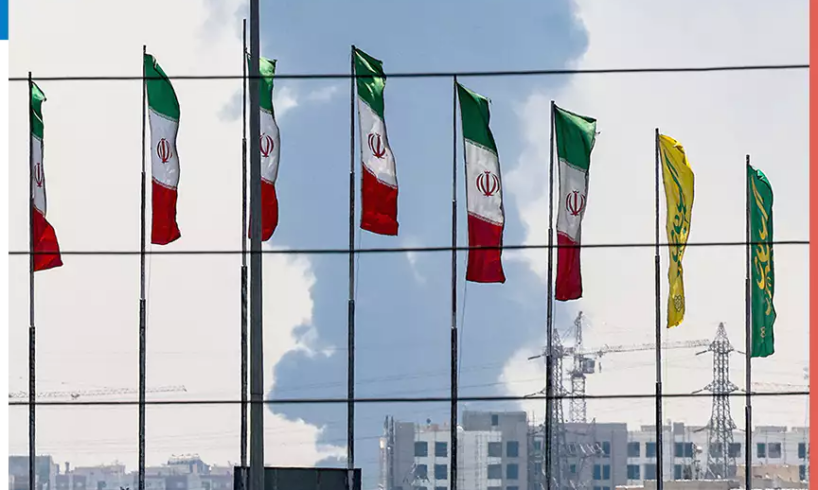
Here is interesting real estate information from Iran: since June, on the Iranian housing classifieds website, apartment owners have been proudly noting that their property is far from military bases. If the Revolutionary Guards or similar installations are nearby, the property value plummets — out of fear of an Israeli strike.
The water pipes in Tehran are shut down six hours a day, but the gallows operate 24/7. Since the beginning of 2025, the Iranian regime has executed 1,500 civilians. Anyone who knows the Mossad knows that the number of its agents will never even approach a fraction of that number. The ayatollahs use mass executions to terrorize the public.
The goal of the war in June, as Prime Minister Benjamin Netanyahu described it, was not only to eliminate the existential threat of the nuclear program, but also to eradicate a new existential threat: thousands of ballistic missiles. Meaning: they are not only a shield against Israeli attacks — they are also a sword.
The Iranians have internalized the message well. They have not resumed the nuclear program, fearing President Trump’s response. Most efforts are now directed at rebuilding their missile program.
The first part is relatively easy — clearing rubble from the underground launch and storage sites. The IDF had blocked them off during the war to prevent massive launches, and now bulldozers are clearing debris. Tehran’s attempt to replenish stockpiles has run into more difficulties after production sites were destroyed, but at the end of each day, Iran still ends up with more missiles than it had that morning.
Nonetheless, Israel is not lacking in options. In Operation Rising Lion, the IDF refrained — on the cabinet’s orders — from two strategic steps: eliminating Iranian leadership and eliminating the country’s economy. Both missions are still possible, and are meant to deter Iran from further military adventurism. To the best of Israel’s knowledge, Iran does not seek to initiate another war, but fears an Israeli strike — and the gap between fear and miscalculation is small. In Jerusalem, officials still hope for a domestic uprising that will end the situation peacefully — and at the same time lead to the complete cutoff of all support for Hezbollah and Hamas. Since the war, the Iranian public’s distrust in its leadership has deepened, but fear remains the prevailing emotion. Somewhere, centrifuges turn, and so does the public’s fear, slowly becoming the anger that could fuel regime change.
The attorney general’s bodyguard
Micha Shaked is still considered a legend in the State Attorney’s Office. In the 1980s and 1990s he served as the prosecutor in the trial of John Demjanjuk, the Ukrainian murderer from the concentration camps with the blood of thousands of Jews on his hands. Demjanjuk was initially convicted and sentenced to death, but after the Iron Curtain fell, Shaked discovered evidence in the Soviet archives that raised doubts regarding Demjanjuk’s identity. He did not hesitate for a moment, and presented the material to the judges, thereby leading to the acquittal of the man Shaked had asked to send to the gallows.
Justice before victory, truth before professional achievement. It is no wonder that this story became a foundational myth in the Attorney’s Office, until it found its way into a book edited by former Deputy Attorney General Dina Zilber for Israel’s 70th anniversary. The chapter was written by attorney Yonatan Kramer, one of the most senior and substantive figures in Attorney General Gali Baharav-Miarah’s circle.
Fortunately for Shaked, he no longer works for the State Attorney, otherwise he would certainly have been reprimanded by Baharav-Miarah and left to sit alone in the cafeteria. This week, when a senior police investigator sought to testify in Benjamin Netanyahu’s trial about suspected criminal acts committed during the investigation into the prime minister, the prosecution’s representatives immediately jumped up and shouted “Objection!”
Photo: Gideon Markowicz Gideon Markowicz
They apparently have not read the chapter about Micha Shaked, nor late Supreme Court President Miriam Naor’s speech: “The state can never lose a trial, because the public interest is the state’s interest.” When you think that you are the state, it’s no surprise that you don’t grant Netanyahu what you granted even to Demjanjuk.
The shock at the criminal behavior of the IDF military advocate general, which only intensified after her fake suicide attempt, echoes the same suspicion: that the institutions entrusted with enforcing law and justice care less about law and justice — and more about protecting themselves.
Still, very senior police officials claimed this week in their defense that it was not negligence or insiders that caused the delay in the military advocate general’s arrest, but the need to find evidence. At the center of the criticism against them is the fact that the resigning major general learned of the investigation from the IDF and was then given many days to prepare a defense.
We had no choice, say the officials. Precisely because Yifat Tomer-Yerushalmi had shown such increased interest in the polygraph of her subordinate, it was impossible to pull the junior officer out of the Military Advocate General’s Corps without arousing suspicion. Had we questioned her before reasonable suspicion was established, we might have destroyed her career only to discover a month later that there was nothing to the suspicion.
In the same vein, opponents of the legal establishment are likely to be sorely disappointed even if the missing phone is retrieved from the depths of the sea. If the military advocate general had incriminating evidence about the attorney general, she would surely have bargained with it in exchange for recognition as a state witness.
The more substantial claim against Baharav-Miarah concerns her assistance in defending the fictitious leak investigation conducted by the military prosecution. A Supreme Court justice expressed shock this week at the misrepresentation by Baharav-Miara’s people regarding the supposed tight supervision of the investigation. He will make his views known, if he is assigned to oversee the petition. The Supreme Court is waiting to see which panel President Yitzhak Amit will appoint — after all, he is the attorney general’s bodyguard
Wailing and whimpering
Only one kilometer separates HaTzuk Beach, the site of the military advocate general’s staged suicide attempt, and Tel Baruch Beach, the site of the real suicide of Housing Minister Avraham Ofer in 1977. Both stood at the center of a criminal investigation followed by a collapse in public support. The difference is that the minister denied the allegations, and the major general admitted them.
Nevertheless, the attorney general who announced the investigation into Ofer, Aharon Barak, would not have turned back the clock. In the biography “His Honor”, written with his cooperation, Naomi Levitsky wrote that Yitzhak Rabin felt that Barak bore responsibility for what happened. Barak, however, felt that he behaved exactly as an attorney general should. “I had no other choice,” Barak said — and he was right.
This is also an apt response to the vile, political, and false campaign that unfolded during the half hour in which it seemed that Yifat Tomer-Yerushalmi had committed suicide. The attorney general who opened the criminal investigation was, of course, not accused of anything — she is one of “ours.” The shaky accusations claimed that the criticism of the military advocate general drove her to suicide — not, heaven forbid, the fact that she went from major general to fugitive suspect in 72 hours.
IDF Military Advocate General Yifat Tomer-Yerushalmi Oren Ben Hakoon
I was young when Rabin was assassinated, and am now relatively old, and I naïvely thought the days were over in which an entire camp was held responsible for the murder committed by one man. Well, I was wrong: the situation has worsened — now the camp is accused of assisting suicide. According to this logic, harsh criticism of the military advocate general drove her to a dead end.
For months they have called Netanyahu aide Jonatan Urich a traitor and former Communication Ministry Director Shlomo Filber corrupt. What exactly is the difference? Only that the two did not fake a suicide attempt? If ugly words caused self-harm, every beach in Israel would have long since been closed for public safety.
Of course, the story is not deep concern over a “lynch-mob atmosphere,” but another attempt to silence the other side. Tomer-Yerushalmi is merely serving as the tape.
For as is well known, all means are permitted — but not everyone is fit to use them. For example, the serial road-blockers express shock when suddenly Mordechai David blocks them personally (the original justification, you will surely be surprised to learn, is that “it’s not the same thing”).
And so, the people who brought you the term “death-eaters,” the professor with the black flag who called millions of people “Nazis,” the camp that claims IDF soldiers kill babies for fun, are now complaining about the tone of public discourse. Those who have done the most to pollute public discourse are now posing as its janitors. While crying and whining.





